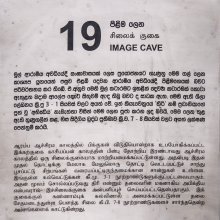Hisa, Hisā: 2 definitions
Introduction:
Hisa means something in Hinduism, Sanskrit, Marathi. If you want to know the exact meaning, history, etymology or English translation of this term then check out the descriptions on this page. Add your comment or reference to a book if you want to contribute to this summary article.
Images (photo gallery)
In Hinduism
Shaivism (Shaiva philosophy)
Source: archive.org: Indian Historical Quarterly Vol. 7 (shaivism)Hisā (हिसा) refers to one of the twenty-four names of the Lāmās, according to the 8th-centry Jayadratha-yāmala.—While describing the special practices of the Lāmās mentions the special language to be used with them. This language is described as monosyllabic (ekākṣara-samullāpa) and may thus be considered to have belonged to the Sino-Tibetan family as the Lamas themselves belonged to the Tibetan group of mystics. The Lāmās [viz., Hisā], according to this language, had 24 different names.

Shaiva (शैव, śaiva) or Shaivism (śaivism) represents a tradition of Hinduism worshiping Shiva as the supreme being. Closely related to Shaktism, Shaiva literature includes a range of scriptures, including Tantras, while the root of this tradition may be traced back to the ancient Vedas.
Languages of India and abroad
Marathi-English dictionary
Source: DDSA: The Molesworth Marathi and English Dictionaryhisā (हिसा).—& hisēdāra See hissā & hissēdāra.
Marathi is an Indo-European language having over 70 million native speakers people in (predominantly) Maharashtra India. Marathi, like many other Indo-Aryan languages, evolved from early forms of Prakrit, which itself is a subset of Sanskrit, one of the most ancient languages of the world.
See also (Relevant definitions)
Starts with (+11): Hisab, Hisaba, Hisaba-jamca, Hisabakitaba, Hisabasanti, Hisabi, Hisada, Hisadanem, Hisaka, Hisakahisaka, Hisakanem, Hisakani, Hisakavani, Hisakavinem, Hisaku, Hisal, Hisalanem, Hisalu, Hisam, Hisamana.
Ends with (+119): Abhisa, Adakushisa, Adharmamahisha, Adhisha, Agramahisha, Amashisa, Angadhisha, Anjihisha, Annadhisha, Anugrahisha, Aphisa, Arghisha, Ashvamahisha, Asisa, Atithisha, Aushadhisha, Avachichisha, Avyathisha, Bahisa, Bakhashisa.
Full-text: Lama.
Relevant text
No search results for Hisa, Hisā; (plurals include: Hisas, Hisās) in any book or story.

